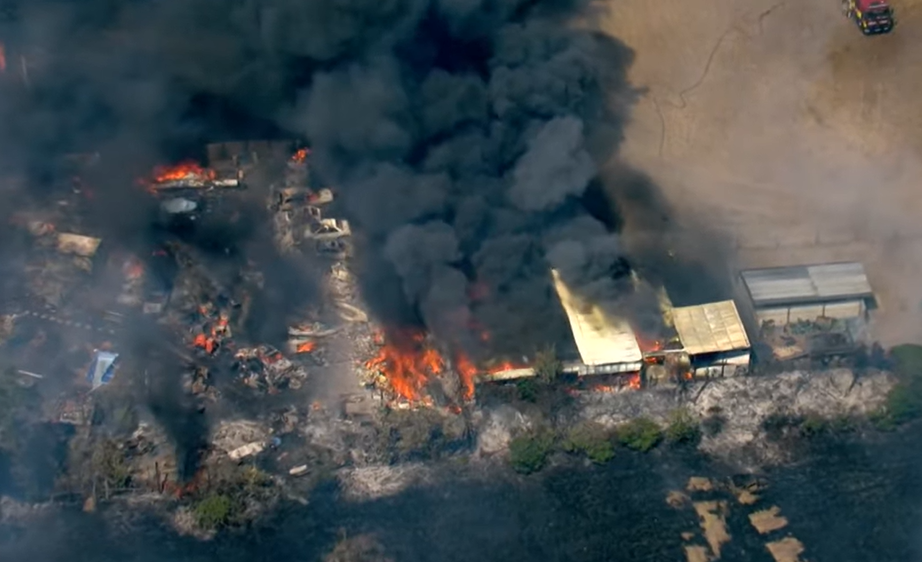Wildfires, raging temperatures: This is the cry of Mother Nature in distress
Editorial: Our rapidly changing climate is veering out of its normal ranges even more rapidly than the scientists were expecting

It is often said that the country cannot afford to do what needs to be done to prevent a catastrophic climate crisis. The unreal and unprecedented temperatures recorded in recent days suggest rather more strongly that the country cannot afford not to do whatever it can to restrict the emission of greenhouse gases into the atmosphere.
Our rapidly changing climate is veering out of its normal ranges even more rapidly than the scientists were expecting. Summer heatwaves with temperatures exceeding 40C may hit Britain once every few years, with similar abnormal disruptions to the other seasons.
The immediate impact can be seen in the fires, the melting roads, the loss of rail networks, and for those in poor health, increased risk of strokes and heart attacks. The longer-term effects will be subsidence to buildings, failure of crops, loss of fisheries, changes to the natural habitat, increasing incidence of skin cancers, impossible to inhabit workplaces and other unpredictable trends.
Globally it means shortages of water, and wars over rivers, lakes and reservoirs, desertification in Africa and increased migration north. It is not too melodramatic to say that this heat is the cry of Mother Nature in distress.
It deserves to be taken seriously. So it would be nice to hear the contenders for the premiership state words to that effect, rather than urging cuts to fuel duty and advocating a “pause” in the net zero process. Instead, the prime minister has skipped Cobra meetings and spent his time on parties and a “joyride” in a Typhoon fighter jet, complete with needlessly burnt aviation fuel, setting his usual bad example.
Even now, after Cop26 and years of increasing incontrovertible evidence of climate change and high-profile weather events across the globe, there is a depressing complacency about the sacrifices needed to achieve net zero in the short, medium and long term, and a state of denial about the very costly mitigation measures that will be needed to improve national resilience.
We are still living in a fool’s paradise, though one so fiercely hot that it is unsafe to venture outside for long. The fact is that the UK doesn’t even have a plan for net zero, for all Boris Johnson’s ambitious sounding aims. The legal net zero by 2050 target has been so badly neglected that the High Court has told the government to state precisely how its net zero policies will achieve the emissions targets set out in law.
After legal action by Friends of the Earth, ClientEarth and the Good Law Project, the judges – still mercifully outside the grip of our populo-nationalist government – have weighed the evidence and found the government’s effects wanting. The current “strategy” is inadequate, a collection of rubbery aims with no stated method of achieving them, and no accounting for the costs to consumers, business and government respectively.
If, for example, new petrol and diesel-powered cars are to be banned from sale in 2035, how do we know there will be enough affordable electric cars to satisfy demand? If heat pumps are to replace domestic gas boilers, who will pay for them? Who will ensure adequate supply? It is almost as if Boris Johnson doesn’t care about his supposed passion for the environment, because he will be well into his anecdotage by then.
Those, like Mr Johnson and like the deputy (for the moment) prime minister Dominic Raab, who make light of the climate crisis and tell people to “enjoy the sunshine” need to face up to such hitherto freakish weather becoming a relatively normal occurrence.
The same goes for floods, coastal erosion, higher rainfall, more extreme seasons, and other phenomena that will alter the face of the nation and place lives in danger.
It is not beyond hope. There is still time to limit greenhouse gas emissions and restrain the rise in global temperatures. Those who outright deny anthropomorphic climate change have been rightly relegated to the margins of debate, like Flat Earthers, and no longer given the automatic right of reply in the media.
Even so, climate deniers who mock the science and the evidence of their own eyes and thermometer readings are still active, though often camouflaging their arguments by eliding the climate crisis with the cost of living crisis, and dismissing it as some sort of fad of the global elite.
To keep up to speed with all the latest opinions and comment sign up to our free weekly Voices Dispatches newsletter by clicking here
They joke about the drought of 1976 and insult scientists warning of the dangers as “alarmist” – when in reality they simply want to live their life out without care for the coming generations. Climate denial, though less crude and obvious than it was before, remains a pernicious force.
Those who are hit hardest by climate change are often the poorest in a society, the ones who cannot afford to adapt or are unable to emigrate. But the climate emergency will impoverish us all because the cost of living with it far exceeds the cost of stopping it.
Indeed, the ultimate catastrophic danger of the extinction of life on Earth may be edging closer than anyone thought possible, such are the limits of our understanding of Gaia. The climate crisis is not “woke” or “lefty”, or a conspiracy dreamt up by the Chinese or the World Economic Forum, but a scientific and visible fact, and, like the heat, should be impossible to ignore.






Join our commenting forum
Join thought-provoking conversations, follow other Independent readers and see their replies
Comments